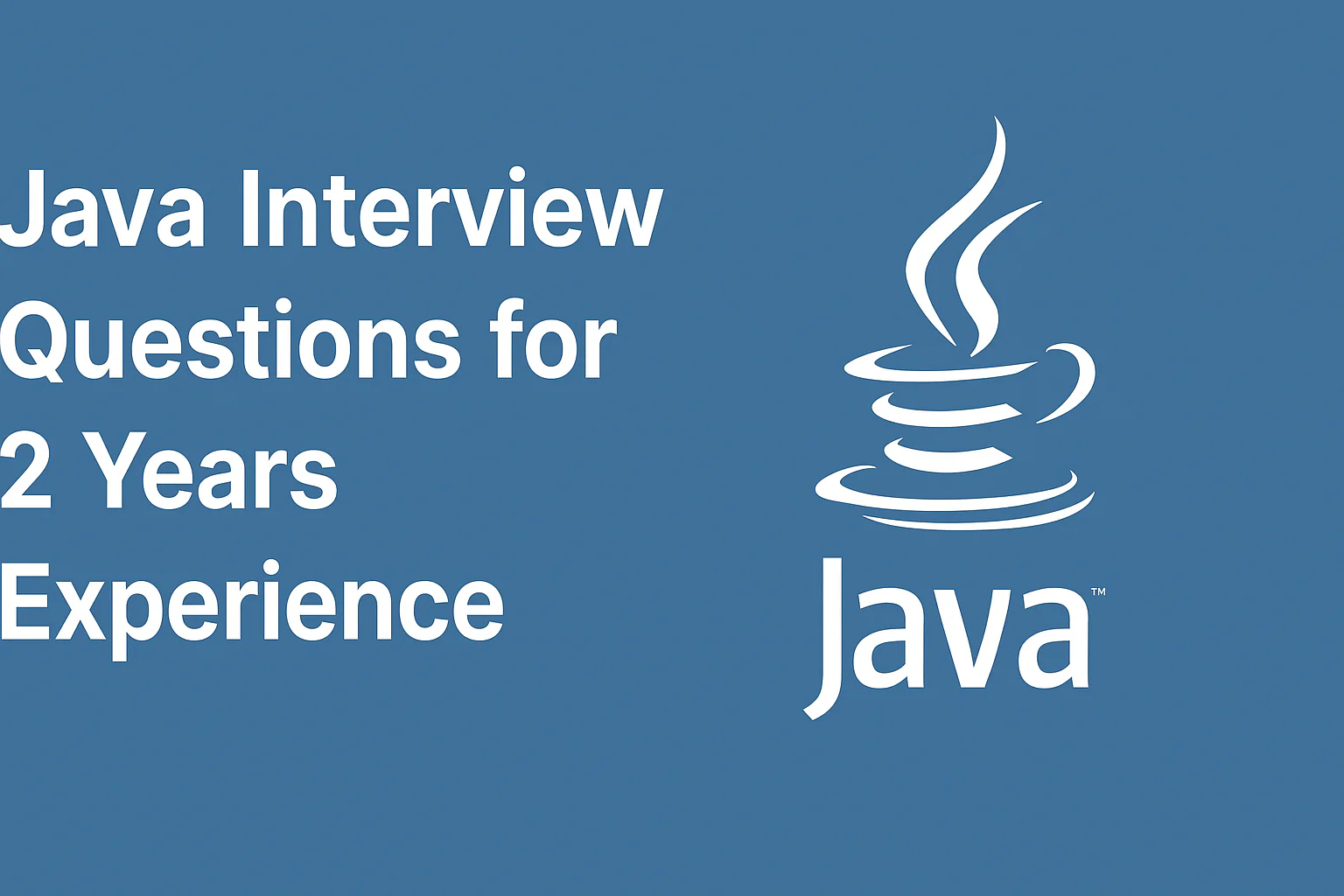
Suppose you have around2 years of Java development experience. In that case, you’re expected to understand the fundamentals of Core Java, be familiar with Java 8 features, and handle basic problem-solving and real-world scenarios. This article compiles the most searched Java Interview Questions for 2 Years Experience to help you ace your upcoming interviews.
Java Interview Questions for 2 Years Experience
1. What is the difference between == and .equals() in Java?
Answer:
==compares object references, i.e., whether two references point to the same memory location..equals()checks for logical equality, typically overridden to compare actual data within objects (like inString).
String a = new String("Test");
String b = new String("Test");
System.out.println(a == b); // false
System.out.println(a.equals(b)); // true2. Explain the concept of Java memory management.
Answer:
Java manages memory through:
- Heap Memory: Stores objects and class instances.
- Stack Memory: Stores method calls and local variables.
- Garbage Collector (GC): Automatically removes unused objects from the heap.
3. What are the main principles of OOP in Java?
Answer:
- Encapsulation – Binding data with methods.
- Inheritance – Code reuse through a parent-child relationship.
- Polymorphism – One name, many forms (overloading & overriding).
- Abstraction – Hiding implementation using interfaces or abstract classes.
4. What is the difference between ArrayList and LinkedList?
| Feature | ArrayList | LinkedList |
|---|---|---|
| Memory | Contiguous array | Doubly-linked nodes |
| Insertion | Slower (shifting) | Faster |
| Access Speed | Fast (index) | Slow (traverse) |
| Best Use Case | Read-heavy | Insert/delete-heavy |
5. What is method overloading and overriding?
- Overloading: Same method name with different parameters in the same class.
- Overriding: Redefining a superclass method in a subclass with the same signature.
6. What is the use of the final keyword in Java?
Answer:
- final variable: Cannot be reassigned.
- final method: Cannot be overridden.
- final class: Cannot be subclassed.
final int x = 5;
// x = 6; // Compilation error7. Explain try-catch-finally in exception handling.
Answer:
try: Code that may throw an exception.catch: Handles specific exceptions.finally: Executes regardless of exception (used for cleanup).
try {
int a = 10 / 0;
} catch (ArithmeticException e) {
System.out.println("Divide by zero");
} finally {
System.out.println("Cleanup code");
}8. What are the key features introduced in Java 8?
Answer:
- Lambda Expressions
- Functional Interfaces
- Streams API
- Default and Static methods in interfaces
- Optional Class
Read More on Java 8 Features
9. What is a functional interface?
Answer:
An interface with exactly one abstract method. It can have default and static methods.
@FunctionalInterface
interface MyFunc {
void execute();
}10. How do Streams work in Java 8?
Answer:
Streams provide a declarative approach for processing collections.
List<String> names = Arrays.asList("Tom", "Jerry", "Spike");
names.stream().filter(s -> s.startsWith("S")).forEach(System.out::println);11. What is the difference between HashMap and Hashtable?
| Feature | HashMap | Hashtable |
|---|---|---|
| Thread-Safe | No | Yes |
| Null Keys/Values | 1 null key allowed | None allowed |
| Performance | Faster | Slower |
12. Explain the String, StringBuilder, and StringBuffer differences.
| Class | Mutable | Thread-safe | Performance |
|---|---|---|---|
| String | No | Yes | Slowest |
| StringBuilder | Yes | No | Fastest |
| StringBuffer | Yes | Yes | Moderate |
13. What is autoboxing and unboxing?
Answer:
- Autoboxing: Converting a primitive to its wrapper type.
- Unboxing: Converting wrapper to primitive.
int a = 10;
Integer b = a; // Autoboxing
int c = b; // Unboxing 14. Difference between == and equals() with Integer?
Integer x = 100;
Integer y = 100;
System.out.println(x == y); // true (cached)For values between -128 to 127, == works because of caching. Use .equals() for value comparison.
15. What are checked and unchecked exceptions?
- Checked Exceptions: Compile-time, e.g.,
IOException. - Unchecked Exceptions: Runtime, e.g.,
NullPointerException.
16. What is the use of Optional in Java 8?
Answer:
To avoid NullPointerException by wrapping values that might be null.
Optional<String> name = Optional.ofNullable(null);
System.out.println(name.orElse("Default"));17. How is synchronized used in Java?
Answer:
Used to prevent thread interference and memory consistency errors in multi-threaded programs.
public synchronized void increment() {
counter++;
}18. Difference between == and .equals() in String pool?
String a = "hello";
String b = "hello";
System.out.println(a == b); // true (same reference from String pool)19. What is the difference between interface and abstract class?
| Feature | Interface | Abstract Class |
|---|---|---|
| Multiple Inheritance | Yes | No |
| Default Methods | Yes (Java 8+) | Yes |
| Constructors | No | Yes |
20. Common Java coding question for 2 years experience
Q: Write a method to check if a number is prime.
public static boolean isPrime(int n) {
if (n <= 1) return false;
for (int i = 2; i <= Math.sqrt(n); i++) {
if (n % i == 0) return false;
}
return true;
}Conclusion
If you’re preparing for interviews with 2 years of Java experience, focus on solidifying your understanding of Core Java, Java 8 features, OOPs concepts, and data structures. Employers expect you to write clean code, understand exceptions, and demonstrate logic-based problem-solving. Download Java.
Bookmark this guide and revisit these questions before your interview. You’ll be better equipped to tackle both technical rounds and HR discussions confidently.
Read More :
- How to Use Arrays in Java (with Code Examples for Beginners)
- Compilation in Java – How It Works with Execution Flow, Steps, and Example
- How to Use loops in Java: For, While, Do‑While Explained
- How to Use If Else Statement in Java (With Examples)
- How to Understand Object-Oriented Programming in Java Easily







